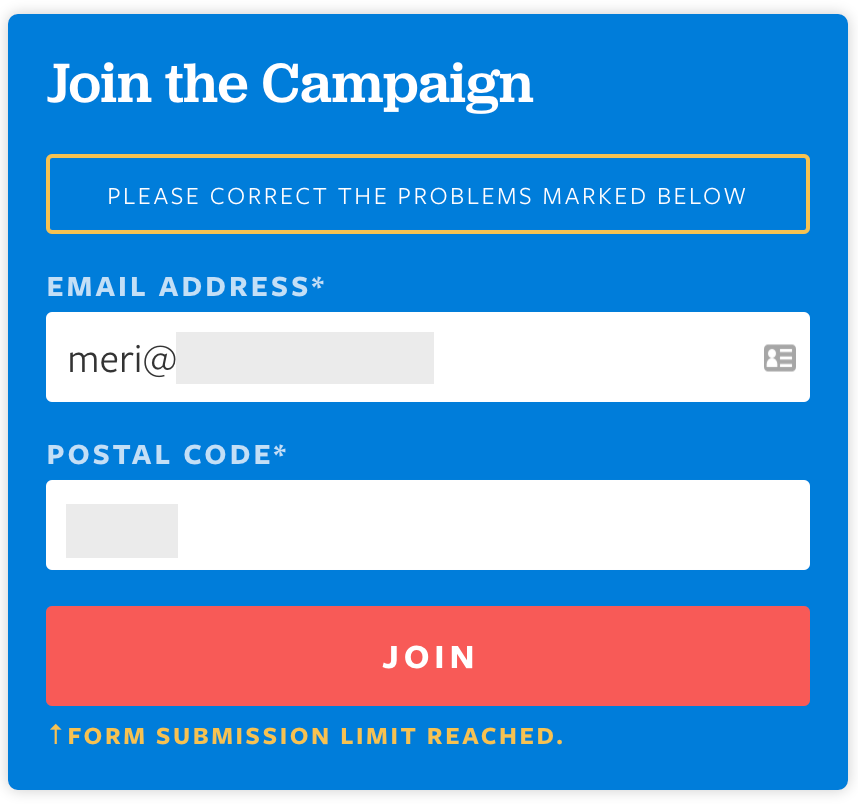Election
Tulsi v. Google: 1st amended complaint
Friday the Tusli Gabbard campaign filed the expected first amended complaint against Google for suspending her adwords account immediately after the first Democratic debate. A full copy of the complaint is available.
Read MoreNovember 2016: The Month In Email
Happy December! Between #blackfriday, #cybermonday & #givingtuesday, pretty much everyone in the US has just survived a week of email from every brand and organization they’ve ever interacted with. Phew.
Is this still the best strategy for most senders? Maybe. But it’s always important to be adaptable and continue to evaluate and evolve your strategy as you move through the year.
As always, I continue to think about evolving our own strategies, and how we might best support senders and ESPs. One of the challenges we face when we talk to senders with deliverability questions is that so many of our answers fall into a nebulous “it depends” zone. We’re trying to articulate new ways to explain that to people, and to help them understand that the choices and details they specify at each point of their strategic planning and tactical execution have ramifications on their delivery. While “it depends” is still a correct answer, I’m going to try to avoid it going forward, and instead focus on exploring those choices and details with senders to help them improve deliverability.
In our community of deliverability and anti-abuse professionals, we are — as you’d expect — quite sensitive to unsolicited email that targets our industry. When an email circulates, even what seems like a reasonably well-thought-out email, it occasionally does not land well. Worse still are the various email-related product and service providers who try to legitimize B2B sales messaging as if it is something other than spam.
The takeaway from these discussions for senders is, as always: know your audience. This post about research from Litmus on millennials and spam is a great example of the kinds of things you might consider as you get to know your audience and how they prefer to communicate.
We also had a presidential election this month, one that made much of issues related to email, and it will be interesting to see how the candidates and parties use the email data they collected going forward.
In industry and security news, we saw over a million Google accounts breached by Android malware. We also saw some of the ramifications of a wildcard DNS entry from a domain name expiration — it’s an interesting “how things work” post if you’re curious. In other “how things work” news, we noted some of the recent changes AOL made to its FBL.
I answered an Ask Laura question about dedicated IP pools, and I have a few more queued up as well. As always, we want to know what questions are on the minds of our readers, so please feel free to send them over!
Almost time to vote
I have to admit, the closer we get to election day the more distracted I’m getting. This will be the 8th presidential election I’m eligible to vote in and one I’m following closely. We even watched the 2nd debate live on the trip over to the UK.
As with the 2008 and 2012 election, email marketing is a huge portion of candidate strategy. Many companies have been tracking how the candidates are using email. Return Path has pulled together a lot of interesting data on their Election Archives, and many other ESPs have thrown their two cents in when it comes to election email.
When this election season started, feels like 10-gazillion years ago now, I started signing up for different candidate lists to see what they were doing with email. I quickly fell behind when so many Republican candidates through their hat in the ring. By that point, I knew other folks were monitoring email and reporting on email and decided to drop the project. I just couldn’t keep up and other people could do it better.
We did comment on the Trump campaign spamming foreign leaders. I think it’s important to realize that deliverability rules don’t get thrown out the window simply because you have an important name or are running for president. A few years ago, one campaign was SBLed on election night and their ESP cut them off. I happen to know the person running compliance there and they supported that candidate but policies are policies.
We also shared a post from someone speculating about how Secy Clinton had access to a private server. The speculation was somewhat wrong, in that the server was already there and set up for Pres. Clinton when he left office. But other than that, much of the other stuff that’s come out has made it clear that email in the State Department was a total mess. I still think a private server was way more secure than an @gmail.com or @aol.com account; it was absolutely more secure than a Yahoo.com account.
This election is important, so I encourage all my readers to get out and vote next Tuesday. There’s more to vote on than just the presidency, too. Here in California we have something like 17 ballot initiatives. Yay, Democracy?
I suspect many folks are in a similar boat and finding it hard to concentrate on things beside the election. So much feels up in the air and important and it’s like we’re all holding our collective breath. After being in the UK last month, I realized how much elections have consequences. The falling pound made it great for us as visitors. But it’s not all sunshine and roses as companies try and sort out how they can absorb a loss in buying power on the open market.
Go vote. It’s important.
Politician sends spam, experiences consequences, news at 11
Over the weekend I’ve been seeing a number of over the top, hyperbolic blog posts about the Trump Campaign’s agency getting suspended from their ESP for spamming. Adestra suspended the Donald Trump campaign for “for committing some of the most egregious spamming in the history of the Internet in an effort to save his broke campaign.”
That quote about “most egregious spamming” is from some partisan website that is all about making Trump look bad. I did actually laugh out loud reading most egregious. Let’s be real here. This incidence of spamming doesn’t even make it into the top 100 of the ones I know about. And it’s not like I’m particularly well up on who’s spamming what.
This really is business as usual in the email space and particularly the political email space. Political sender, be they special interest groups or politicians, are sloppy with permission and will send mail to any email address they get their hands on. I talked about this last week: Spam Filtering is Apolitical
The Trump campaign isn’t the first political campaign to send spam. It wasn’t huge news in 2012, but the Romney campaign was doing some bad stuff with their email marketing. They were working with snowshoe spammers. They were listed on the SBL. They got cut off by their ESP.
While Spamhaus doesn’t keep historic records, I found a post from 2012 on the “Mainsleaze” about the Romney campaign / supporters and their use of spam as a campaign tactic. In the comments on that post a representative of Spamhaus says, “Entirely too many political operatives and some of those who work with them at ESPs feel entitled to ignore the usual rules and send opt-out bulk email to anybody they wish.” This is true, and something I’ve repeatedly mentioned on this blog.
Bad data drives delivery problems
It’s a wild election season here in the US. In the past few presidential elections, email has played a bigger and bigger role in messaging and fundraising. President Obama’s campaign used email effectively, but sent huge volumes. In fact, the volume was so heavy, it led to a joke on the Daily Show.
Read MoreI cannot feel the Bern.
On a lark (and to do my best to stay as informed as possible via primary sources) I decided to sign up for the official mailing lists of the Trump, Clinton, and Sanders campaigns.
Both Trump and Clinton were happy to take my email address and add it to their distribution lists, no confirmation required. Not terribly surprising, since they need to make it as easy as possible to get their messages out to anyone who will listen.
On to the Sanders campaign.
I… couldn’t figure out how to subscribe to Sanders’ mailing list.
I feel I must have missed something obvious. I’m certainly not saying that I’m a super-genius or anything… but, at the same time, if I can’t figure out how to get your mail, then it might just be that others are having similar problems.
The first obvious place to sign up for updates was the big blue “This is your movement” box. That route requires a donation to proceed. Back to the main page.
The next option would sign me up for mobile alerts. No thanks.
All the way at the bottom of the page, a final big blue box asks, “Are you ready?” Somewhat beyond ready, I entered my information, clicked “Join us” and held my breath.
The “Form submission limit reached” error is likely indicative of the use of outsourced product or service being used to collect and manage contact information on behalf of the campaign. My actually seeing this error is indicative of insufficient testing of the site by the campaign.
I’m sure the developer promised a bulletproof site, and it seems the campaign took this on faith. But at least one thing fell through cracks, resulting in the campaign not just losing an avenue of communication with someone who has self-selected as interested, but also potentially diminishing that person’s opinion of how the campaign manages the finer points, and wondering how that ultimately reflects on the candidate. Ultimately, it doesn’t matter whether or not the campaign developed the site themselves or hired someone else to do it on their behalf. All that matters is that they put their name on it, and let it speak for their brand.
Campaigning is sales. Whether you’re selling a candidate or a stock portfolio or a hand-made product, when you invite your audience to interact with you online, they must find the experience to have been worth their time, otherwise they’re unlikely to take you up on any future invitations. In business, as in politics, there’s a lot on the line, communication is vital, and mastering digital interaction with the public is no longer optional.
And while I was writing this post, I started receiving mail from the Sanders’ campaign. So I guess I could subscribe after all.
Deliverability advice to the DNC
I was working on another post for this afternoon, but when I checked Facebook Autumn Tyr-Salvia had posted a link that’s much more interesting to talk about.
It seems the Democratic National Committee has acquired President Obama’s email list from the 2012 campaign.